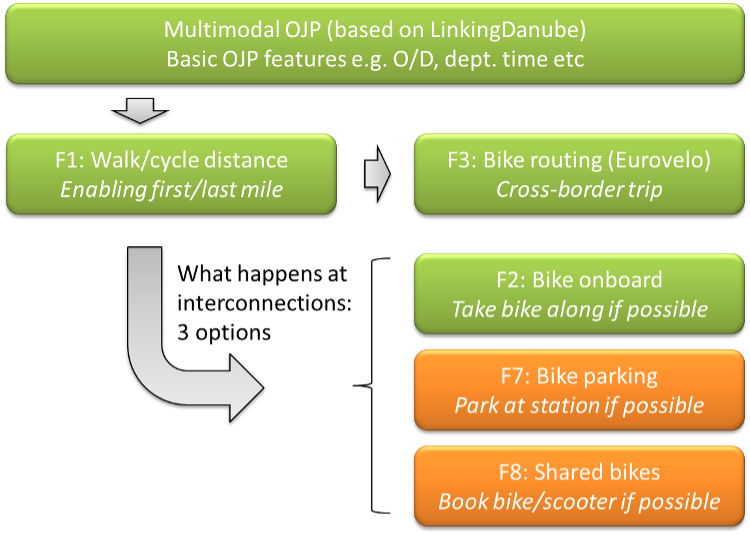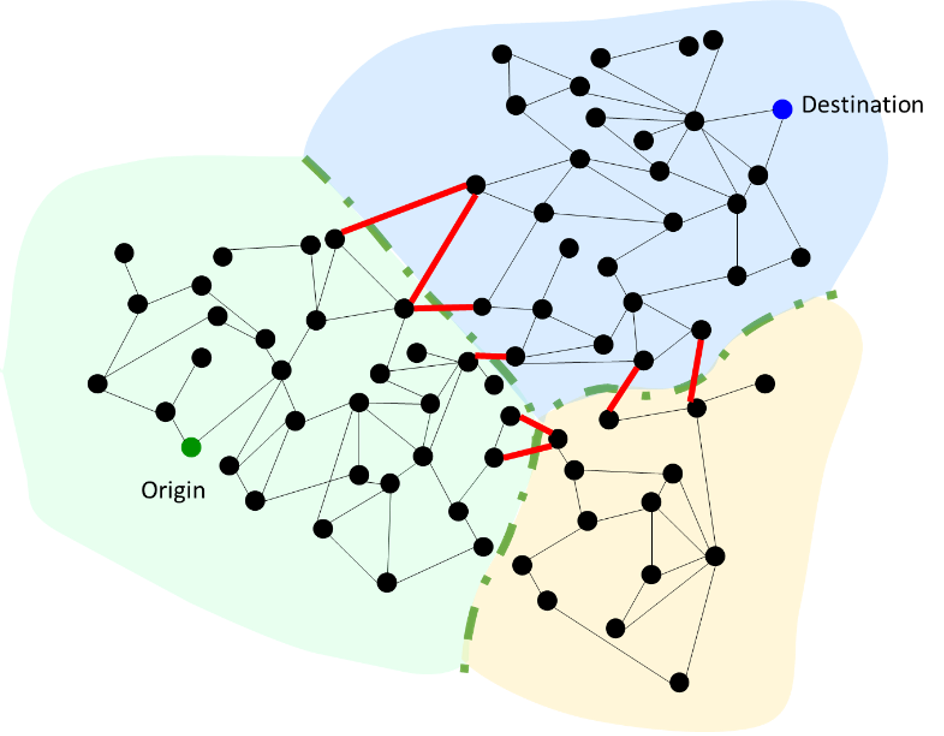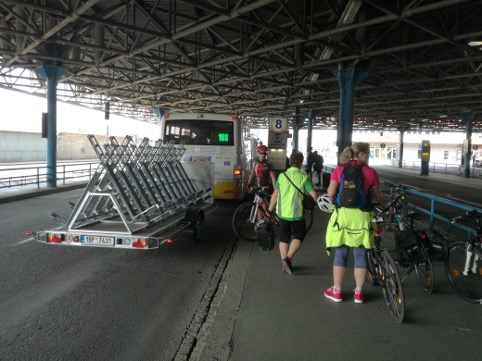|
WP T1: A.T1.2 — Developing the Organisational Architecture of OJP by ATE, Vienna, Austria
In addition to a resilient technical architecture, an organisational architecture must be developed to complement the technical components and to ensure a sustainable and smooth operation of the OJP4Danube service also beyond the project period.
As part of WP T1, an organisational architecture was drafted within D.T1.2.1 – Transnational operational and organisational architecture for transnational information exchange. In this Deliverable, all relevant elements of the organisational architecture were discussed, including the stakeholder and governance structure, organisational processes, and collaboration structures.
Since the technical development of the OJP4Danube service is continuously progressing, this Deliverable is considered as a starting point and must be adjusted regularly. Notably, the implementation phase in WP T3 is expected to provide significant input for an optimisation of the organisation architecture.
Also, as a part of WP T1, the future adopters’ needs in the Danube Region regarding OJP deployment have been discussed within D.T1.2.2 – Future adopters’ needs in the Danube Region. This Deliverable analyzes the requirements and national environments of Croatia, Moldova, Serbia, Bosnia and Herzegovina and Montenegro and proposes the continuation of dissemination activities in these countries during the next period of the project development.
The findings of these two deliverables will be combined and processed, elaborating a deployment strategy for OJP, which will be outlined in the Output O.T1.1.
WP T2: Elaboration of Multimodal OJP at UNIZA, Zilina, Slovakia
In the previous period leading to the first newsletter, we took the time to review a wide range of features and use-cases relevant for integrating eco-friendly mobility with public transport across the six participating Danube region countries. In this last period, we in the core development team (CDT) analyzed in more detail (together with all six transport information service providers –TISPs) the implementability and interoperability challenges of such features.
The biggest technical challenge is the need to implement first- and last-mile connectivity across borders, particularly in terms of ensuring the necessary cross-border hubs – called ‘Exchange Points’ – which are provided and dynamically selected by the Central OJP Router. This is needed to ensure cross-border journey planning should function seamlessly for the user. The second challenge is to enable user interface features that are relevant for travelers, while at the same time keeping compatibility with the OJP4 data standard.
For this reason, the CDT team recommended to keep the following most critical features:
- Multimodal OJP: All the basic functionalities required by a standard journey planner tool, basis for implementing additional features to support eco-friendly modes (Features 1-7)
- Feature 1: Accommodate trips that include a portion done by eco-friendly (active) mode like walking or cycling, and allowing the user to specify preferred or maximum distances and speeds
- Feature 3: Support cross-border bike routing which could overlap with existing EUROvelo routes. If possible and data is available, we will consider the option of labeling explicitly EUROvelo routes where relevant but offering EUROvelo as an input option to the user was cancelled due to the routing complications this caused.
- Feature 2: Enable the option ‘Bike-on-board’. The first of three options take place at public transport transfer points: in this case, the traveler decides to embark on a motorized public transport together with his/her bicycle, which is used for the first and last mile of a trip.

- Features 7 and 8 are nice-to-have as alternative options from the user perspective, i.e., the option of parking one’s bicycle at the station instead of taking it onboard, or the option of renting a shared bike or scooter at some destination to complete the last leg of a commuting or tourism trip. More complex features such as Feature 4 on the type and quality of the cycling infrastructure; Feature 5 on providing topographical (ascent) information, and Feature 6 on public transport interchange facilities were dropped due to data availability and data standard challenges.
Ultimately, the user experience design for the above features will now set up.
OJP4Danube — Project Reinforcement at the Institute for Computer Science and Control, Budapest, Hungary
To provide seamless information for the travelers, an effective transnational door-to-door journey planner is required where information from different operators, combined solutions, and value-added parameters appear in a realistic environment. The elaborated output related to the method development of the OJP4Danube project was aimed at finding a proper way of creating a routing option for multimodal transport networks connecting separate systems.
The proposed algorithm extensively supports improving mobility and intermodality. Hence, one of the goals of the development was to provide a seamless multimodal route planning solution. The elaborated method exactly realizes this by identifying the potential exchange points between separate networks, by filtering the suitable exchange points to run the routing algorithm between the local journey planners, and by introducing a utility function to rank the listed alternatives.
The proposed solution is built on a flexible heuristic algorithm which parameters can be easily updated and extended. In case of any changes, using the formulated theoretical background, a constantly up-to-date and realistic implementation can be derived from the foundations of the framework. In addition, the elaborated method is fully capable to cover wide geographical areas and to provide a transferable solution which can be applied by any traveler information service provider.
This solution has extensive benefits regarding the traveler’s experience by supplying value-added information service when planning international routes with different transportation modes. The elaborated method enables a traveler to choose sustainable transportation modes and hence has an additional positive effect on the environment. As a result, a modal shift can be realized with soft initiatives being usually much cheaper and more efficient than hard initiatives.

OJP4Danube — Project Implementation at KORDIS JMK, Brno, Czech
In the South Moravian Region, the project partner KORDIS JMK keeps on implementing the project. The positive news is that the tender for the supplier of the necessary software modifications has been completed. The supplier will provide not only public transport timetables, but also some other transport modes – pedestrian and bicycle transport. This supplier will start work soon and will be built on the completed outputs of the OJP4Danube project.

OJP4Danube — Project E-learning Webtool at the University of Maribor, Maribor, Slovenia
Framed within Work Package 4 and devoted to the transfer of the know-how and the OJP4Danube approach to future adopters, the e-learning webtool will provide a platform for information and educational training on Open Journey Planning and the OJP4Danube approach. The OJP4 Danube e-learning webtool will serve, not exclusively, current and future adopters, OJP implementers and developers, infrastructure and (public) service providers, local, regional and national public authorities, and higher education and research institutions.
Being now built and prepared, the e-learning webtool will serve as a knowledge portal that can encourage the implementation of the developed OJP4Danube multimodal cross-border travel information system in other countries. The Faculty of Civil Engineering, Transportation Engineering and Architecture of the University of Maribor is guiding its preparation and development being supported by the remaining academic and research-oriented partners, ICS, UNIZA, PUT, ZITS and KHM. Content-wise, the webtool will host knowledge on the OJP Standard and its real-life application in the OJP4Danube service, policy background and connections with Public Transport EU Standards, such as Transmodel and NeTEx. The webtool will be built fully considering the requirements, guidelines and recommendations specified in the D.T4.1.1 report on the set up of the e-learning webtool for OJP, which covers the overview of the chosen solution, a synopsis of the content, related features, and technical aspects. The e-learning webtool will be available through the domain ojp4danube-edu.net, expected to be in function in December 2021.

Conceptual mockup of the OJP4Danube e-learning webtool
|
